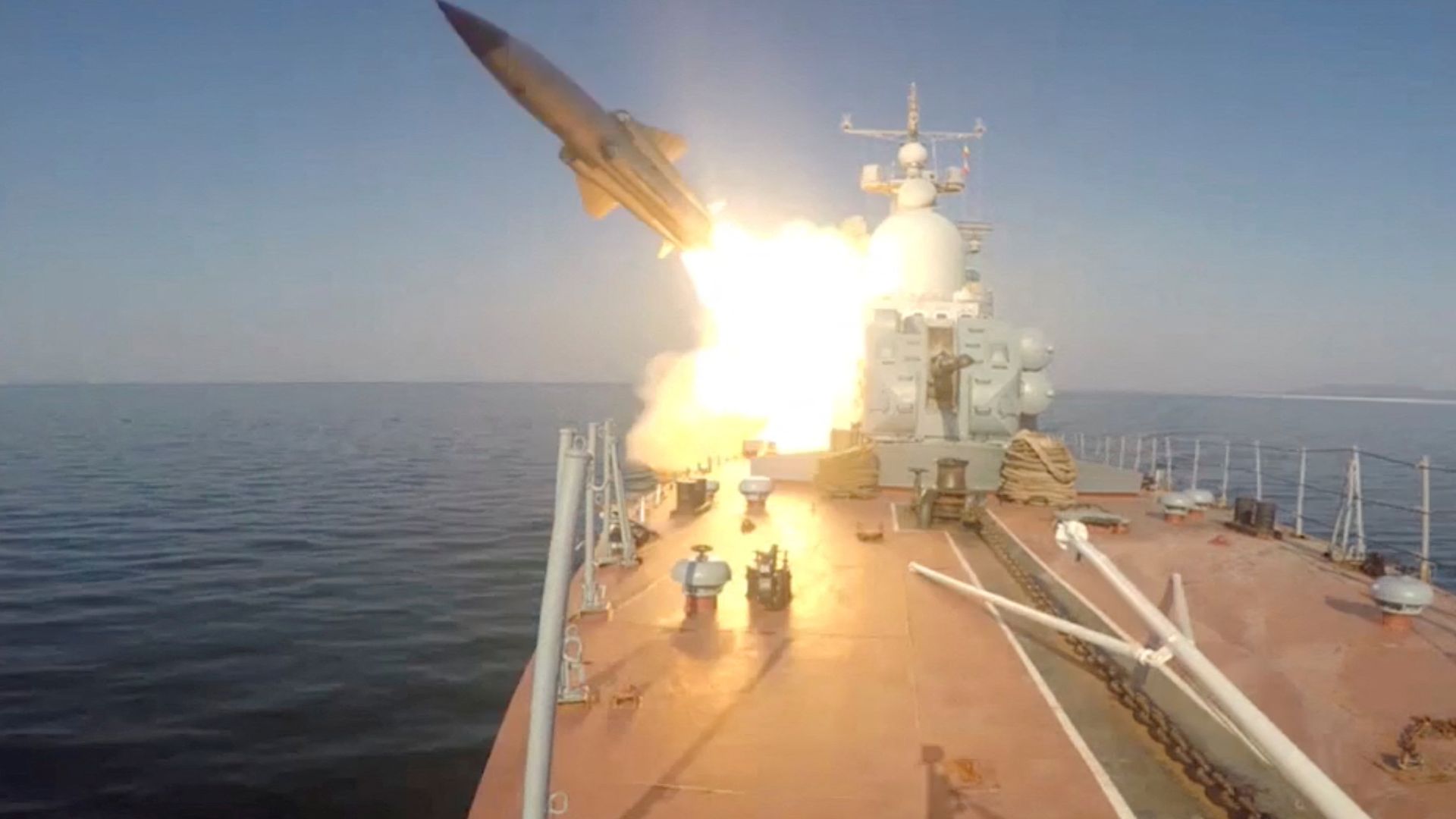
FOR MORE THAN TWO DECADES, VLADIMIR PUTIN HASN’T JUST LED RUSSIA, HE’S PUSHED OUT ANY WHO WOULD OPPOSE HIM. MANY BELIEVE IT’S WHY HE INVADED UKRAINE, AND WHY HE NEVER GOES TOO LONG WITHOUT RATTLING THE SABER.
Dr. Tyler White: I think what Putin is doing is he’s trying to, with the limited resources he has, but with the nuclear weapons he has, make sure that Russia is always at the center of attention, because that gives him power. And he does it by scaring people. And he does it through nuclear blackmail.
DOCTOR TYLER WHITE LEADS THE NATIONAL SECURITY PROGRAM AT THE UNIVERSITY OF NEBRASKA. IN OUR LAST VIDEO, WE ASKED HIM ABOUT HOW AND WHY RUSSIA MIGHT USE NUCLEAR WEAPONS.
BUT THEN WE WANTED TO KNOW WHAT A WESTERN RESPONSE TO THOSE POTENTIAL ATTACKS WOULD LOOK LIKE. IF PUTIN GAVE THE ORDER TO DEPLOY A NUCLEAR WEAPON, WHAT WOULD HAPPEN NEXT?
White: In political science, we have this sort of term gambling for resurrection, right? What happens when all the chips are down, and you need a big move to try to change your situation? And so, you know if he’s looking at what could be a resounding defeat, does he use nuclear weapons as a way of trying to gamble for resurrection, right? To try to turn the tide in a really, really important way, particularly if he feels his own personal future is at stake, right? And I think, to him, that’s way more important than what happens to Russia.
WHITE SAYS ANY WESTERN RESPONSE TO RUSSIA USING NUKES WOULD BE A COORDINATED EFFORT THROUGH NATO, THE MILITARY ALLIANCE COMPRISED OF MORE THAN 30 EUROPEAN NATIONS AND THE U.S.
White: I don’t think we think about this enough, NATO is special. NATO is really special, and the way the United States can, you know, locks itself into NATO, to defend a whole bunch of other countries, that’s special. That’s special in history. And so, you know, it gives us a tremendous amount of power, though. Because people, you know, once you have them on board, and they agree with the decision, you know, as someone once said, ‘democracies fight angry’ and having a bunch of democracies on board, I think, makes a force that no other no other country can encounter.
THE COUNCIL ON FOREIGN RELATIONS, AN AMERICAN THINK TANK, SAYS THERE ARE THREE SCENARIOS THAT COULD LEAD TO RUSSIA RESORTING TO NUKES IN UKRAINE: AS A SIGNALING DEVICE, AS A BATTLEFIELD WEAPON, AND AS A WEAPON OF TERROR.
NATO’S RESPONSE TO RUSSIA USING NUKES DEPENDS ON THE SCENARIO.
IF RUSSIA DECIDES TO DETONATE A NUKE AS A SIGNALING DEVICE, IT COULD COME IN THE FORM OF A TEST AT A REMOTE LOCATION, WHERE CASUALTIES WOULD BE LOW AND THE NUCLEAR FALLOUT LIMITED.
White: So, he could find a target like Snake Island or something like that and detonate a nuclear weapon there. He’s not going to kill very many people. But he’s going to demonstrate, ‘Hey, I just broke the nuclear taboo and I’m willing to use these weapons. Your move,’ right?
DR. WHITE AND THE CFR AGREE RUSSIA DETONATING A NUKE TO REMIND THE WORLD IT STILL HAS NUCLEAR WEAPONS WOULD PROBABLY NOT GENERATE AN OVERWHELMING MILITARY RESPONSE FROM NATO, OTHER THAN THE STANDARD FINGER-WAGGING THAT TYPICALLY ACCOMPANIES NUCLEAR WEAPONS TESTING.
IT COULD, HOWEVER, DAMAGE RUSSIA’S RELATIONS WITH CHINA. PUTIN IS MORE DEPENDENT ON CHINA THAN EVER AS WESTERN SANCTIONS CRIPPLE RUSSIA’S ECONOMY AND FURTHER ISOLATE IT ON THE WORLD STAGE.
UNDER THE SECOND SCENARIO, PUTIN MAY DEPLOY TACTICAL NUCLEAR WEAPONS DURING A BATTLE INSIDE OF UKRAINE. WE’VE TALKED ABOUT THESE WEAPONS BEFORE-TACTICAL NUKES ARE POWERFUL ENOUGH TO DESTROY CITIES, BUT THEY’RE MORE PRECISE THAN BALLISTIC MISSILES, DESIGNED FOR USE ON BATTLEFIELDS WHERE MILITARIES WANT TO CREATE MAXIMUM EFFECT WITH MINIMAL MATERIAL.
THE CFR SAYS PUTIN MAY DECIDE TO DEPLOY TACTICAL NUKES AGAINST ENERGY INFRASTRUCTURE TARGETS TO WEAKEN UKRAINE’S WILL TO FIGHT.
White: He could also use them on the battlefield to destroy formations, right? He could try to wipe out a Ukrainian, you know, offensive or something like that. And that would deal a significant military blow to the Ukrainians, but also again, breaks the nuclear taboo.
RUSSIA USING TACTICAL NUKES WOULD FURTHER FRACTURE ITS RELATIONSHIP WITH CHINA, POTENTIALLY PUSHING THE “FRIENDSHIP WITHOUT LIMITS” TO THE BRINK OF COLLAPSE.
AS FAR AS HOW THE U.S. AND NATO WOULD RESPOND, THE PUBLIC POLICY IS PURPOSEFULLY AMBIGUOUS. PRESIDENT JOE BIDEN SAID ANY USE OF NUKES IN UKRAINE, ON ANY SCALE, WOULD BE UNACCEPTABLE AND WOULD ENTAIL SEVERE CONSEQUENCES. THE AMBIGUITY IN THE POLICY ALLOWS FOR A RANGE OF RESPONSES, AGAIN, DEPENDING ON HOW RUSSIA DETONATES ITS BOMBS.
IF RUSSIA USES TACTICAL NUKES IN UKRAINE, AT THE VERY LEAST WESTERN WEAPONS SHIPMENTS AND HUMANITARIAN AID WOULD SKYROCKET. WHATEVER ECONOMIC SANCTIONS HAVEN’T BEEN IMPOSED YET PROBABLY WOULD BE, AND RUSSIA WOULD CEMENT ITS STATUS AS A DIPLOMATIC PARIAH ON THE WORLD STAGE.
White: And so I think Putin is constantly calculating, you know, what is my exit strategy? What does it look like? What can I live with? What’s acceptable? But he’s not the only person who gets to make that decision, right? I mean, reality in this case has a vote as well. I think what we worry about is that he will come to the conclusion that this is his best option. But again, there are some significant issues for him to do that.
THE THIRD SCENARIO FOR RUSSIA, IS DEPLOYING NUKES AS WEAPONS OF TERROR. IT’S DEFINITELY THE SCARIEST SCENARIO, AND THANKFULLY, THE LEAST LIKELY. BUT RUSSIA TARGETS CIVILIANS WITH CONVENTIONAL WEAPONS ROUTINELY, SO IT’S NOT IMPOSSIBLE TO RULE OUT PUTIN GIVING THE ORDER TO LAUNCH A STRATEGIC NUCLEAR WEAPON AT CIVILIAN TARGETS LIKE A CITY.
SUCH A STRIKE COULD BE HUNDREDS OF TIMES MORE POWERFUL THAN A TACTICAL NUCLEAR WEAPON AND WOULD BE DESIGNED TO DESTROY UKRAINIAN RESOLVE. BUT EVEN A RUSSIAN NUCLEAR STRIKE IN UKRAINE MAY NOT ELICIT A NUCLEAR RESPONSE FROM NATO.
White: We have conventional capabilities that could, you know, target very specific capabilities inside of Russia, inside of Belarus, wherever the missile came from, as a way of saying, you know, ‘you can’t do that, but we’re not going to escalate using a nuclear weapon right now,’ right? So, that keeps the onus on the Russians. Now, they’re going to have to do it twice, right? Which means that whatever hole they’ve been digging is now deeper.
IF WE THINK OF NUCLEAR ESCALATION AS A LADDER, RUSSIA’S USE OF STRATEGIC NUCLEAR WEAPONS OUTSIDE OF ITS BORDERS IS THE TOP RUNG. IT’S THE SITUATION EVERYONE WANTS TO AVOID, AND THE ONE PUTIN AND HIS CRONIES LIKE TO THREATEN THE MOST. IT’S ALSO ABSOLUTELY THE LEAST LIKELY SCENARIO, MAINLY BECAUSE IT WOULD BE THE END OF RUSSIA.
WITH CONVENTIONAL WEAPONS ALONE, THE U.S. AND NATO COULD STRIKE KEY RUSSIAN TARGETS ANYWHERE ON THE GLOBE WITHIN ONE HOUR. RUSSIAN MILITARY BASES, INSTALLATIONS AND LEADERSHIP CENTERS WOULD BE FAIR GAME ALONG WITH WHATEVER AIR, LAND OR SEA ASSETS RUSSIA HAS DEPLOYED OUTSIDE OF ITS BORDERS.
ALSO, CHINA, THE ONLY RUSSIAN ALLY WITH ANY REAL MILITARY MIGHT, WOULD NO DOUBT CUT TIES, LEAVING VLADIMIR PUTIN ALONE. THE LEADER OF A FAILED STATE.
HOWEVER UNLIKELY THAT SCENARIO IS, UNFORTUNATELY, IT’S STILL NOT IMPOSSIBLE. ALSO, THERE’S NO GUARANTEE SOMEONE MORE MENACING THAN PUTIN DOESN’T RISE TO POWER.
White: When it comes to nuclear weapons, you want to do everything you can to try to mitigate that risk, right? And it’s a fine balance, because sometimes your notion of trying to mitigate risk of, you know, to you looks completely rational, and to them, it looks incredibly you know, provocative, right?
WHITE SAYS FIGURING OUT THE RIGHT RESPONSE TO NUCLEAR WEAPONS IS THE TRICKIEST PUZZLE THERE IS, BECAUSE YOU’RE COMMUNICATING WITH FORCE. YOU WANT YOUR MESSAGE TO BE RECEIVED AND FOLLOWED, BUT YOU CAN’T CONTROL YOUR ADVERSARY’S RESPONSE.
FOR MORE ABOUT RUSSIA AND ITS ARSENAL OF NUCLEAR WEAPONS, BE SURE TO CHECK OUT ALL OF OUR REPORTING AT SAN.COM, WHERE YOU’LL ALWAYS FIND THE UNBIASED, STRAIGHT FACTS.






